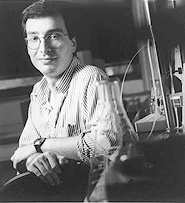Philip A. Cole
 PHILIP A. COLE, Med 1991 (MD, PhD), the E.K. Marshall and Thomas H. Maren Professor of Pharmacology, graduated from Yale University with a BS in chemistry in 1984. Following a year spent as a Churchill Scholar in Cambridge, he pursued MD-PhD studies at Johns Hopkins, graduating in 1991. His PhD research was carried out in Cecil Robinson’s lab in the Department of Pharmacology and concerned chemical approaches to aromatase mechanism and inhibition. He then went on to complete residency training in Medicine at Brigham and Women’s Hospital in Boston in 1993. From 1993-1996, Cole was a postdoctoral research fellow in Chris Walsh’s lab at Harvard and a clinical endocrine fellow at the Brigham. In 1996, Cole moved to Rockefeller University as assistant professor and head of the lab of bio-organic chemistry. In 1999, he returned to Hopkins as director of pharmacology and E.K. Marshall and Thomas H. Maren Professor.
PHILIP A. COLE, Med 1991 (MD, PhD), the E.K. Marshall and Thomas H. Maren Professor of Pharmacology, graduated from Yale University with a BS in chemistry in 1984. Following a year spent as a Churchill Scholar in Cambridge, he pursued MD-PhD studies at Johns Hopkins, graduating in 1991. His PhD research was carried out in Cecil Robinson’s lab in the Department of Pharmacology and concerned chemical approaches to aromatase mechanism and inhibition. He then went on to complete residency training in Medicine at Brigham and Women’s Hospital in Boston in 1993. From 1993-1996, Cole was a postdoctoral research fellow in Chris Walsh’s lab at Harvard and a clinical endocrine fellow at the Brigham. In 1996, Cole moved to Rockefeller University as assistant professor and head of the lab of bio-organic chemistry. In 1999, he returned to Hopkins as director of pharmacology and E.K. Marshall and Thomas H. Maren Professor.
His research career has focused on the application of chemical methods to address biomedical problems. His group’s scientific achievements include the development, in collaboration with Tom Muir, of a simple and widely used method to carry out protein semi-synthesis called expressed protein ligation. His lab has applied this method to study the detailed aspects of protein phosphorylation and acetylation. In addition, his group has demonstrated that there is a dissociative transition state in protein kinase reactions and has used this model to design the first potent mechanism-based protein kinase inhibitors. Cole’s lab also developed the first selective melatonin rhythm enzyme and HAT (histone acetyltransferase) enzyme inhibitors which are currently being employed to study circadian rhythm and gene regulation, respectively. Cole’s group has been the first to chemically rescue a mutant enzyme (protein tyrosine kinase) in living cells and is exploiting this strategy in the analysis of cell signal transduction pathways.
Among his honors include a Damon-Runyon Scholar Award, a Burroughs-Wellcome Award in Toxicology and an Ellison Medical Foundation Award.